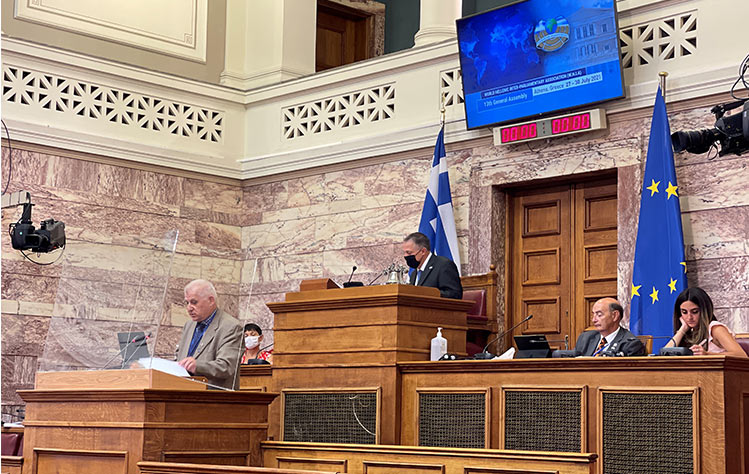Webster Professor Speaks at Hellenic Parliament on Trans-Atlantic Relations
August 19, 2021
 A Webster University faculty member delivered a speech at the 13th World Hellenic
Inter-Parliamentary Association (WHIA) in the Greek Parliament, July 29, 2021.
A Webster University faculty member delivered a speech at the 13th World Hellenic
Inter-Parliamentary Association (WHIA) in the Greek Parliament, July 29, 2021.
John M. Nomikos spoke on Eastern Mediterranean and Transatlantic Relations: A Greek Perspective." He is an associate professor based at the Webster Athens campus and director at the Research Institute for European and American Studies (RIEAS)
Nomikos' speech was attended by WHIA members from Albania, Canada, France, Germany, Jordan, Kenya, Sweden, USA, and Australia.
An overview of his comments appears below:
"The change of guard at the White House after November 2020 has inaugurated a new era in transatlantic relations. President Biden announced that “America is back” and promised expanded cooperation between Washington and its NATO allies on a host of strategic issues of common interest such as:
- Intelligence collaboration
- Transatlantic homeland security
- Risk assessment
- Trade relations
- Human rights, and
- The environment
"Specific future opportunities include a reappraisal of economic relations with the view of expanding transatlantic trade; a broad reassessment of common security and defense; combating the pandemic and expanding vaccination programs; reassessing approaches to energy security; and strengthening collaboration on battling international terrorism.
"During NATO summit 2021, the transatlantic partners agreed to promote “resilience as a national responsibility for all NATO members” with the view of promoting a common effort to expand security cooperation on combating violent extremism and radicalization. Key to this effort is closer and robust coordination between the U.S. Department of Homeland Security and the common European Union security apparatus. That being set, this expanded cooperation should address the eventual establishment of a transatlantic homeland security organization as well as the formation of an EU intelligence agency. These initiatives will strategically expand the common defense against not only international terrorism but, also, the growing threat of cyber-attacks against national infrastructures.
"Coming, more specifically, to the geopolitical fragility of the Eastern Mediterranean Region, recent developments have exacerbated tensions and underlined the necessity of formulating a common security blueprint in addressing regional political and security instability.
"EASTMED is now a “hot button” region given growing regional instabilities emerging from significant strategic shifts such as:
- Russia’s return to the Warm Waters and its persistent involvement in the Syrian crisis
- China’s aggressive regional expansion via politico-economic initiatives
- Conflict over undersea hydrocarbon resources
- Turkey’s aggressive challenges directed at Greece and the Republic of Cyprus via Ankara’s Blue Homeland ambitions and the standoff between the EU and Turkey emerging thereof
- The continuing security conundrum that has developed across the North African Mediterranean rim
- And the latest aggressive Turkish moves in Northern Cyprus aiming at the de facto abrogation of UN efforts to reunite the island.
"Against this backdrop, regional actors are uniting their efforts to combat Turkish-instigated instability. A good example of this security-diplomatic shift is the launch of the East Med Gas Forum following an Egyptian initiative in 2019. The formal unveiling of the initiative came in 2020 with Cyprus, Egypt, France, Greece, Israel, Italy, Jordan, and Palestine signing the framework agreement in September 2020. Significantly, both the EU and the US are formal Permanent Observers of the forum. The direct offshoot of the forum is Eastern Mediterranean pipeline, or simply EastMed, aiming to secure Greek access to EastMed natural gas resources via Cyprus and Israel. The EastMed initiative has been approved by EU as well.
"Other EastMed energy initiatives include a common Greek-U.S. private commercial effort, initiated in 2008, to develop wind power infrastructure, based on smaller sparsely populated islets belonging to the Cyclades and the Dodecanese, with the purpose of electricity generation. A similar project, the Southern Aegean Interconnector (SAI), aims to facilitate energy transfer via Egypt to Crete and neutralize the illegal agreement between Turkey and Libya regarding exclusive economic zones. SAI will enhance Greek energy security via Renewable Energy Resources (RES) by way of building power plants on twenty-three small uninhabited Aegean islets in addition to similar infrastructure established in Crete and the Dodecanese islands. Overall, SAI is conceived as a strategic guarantee for both Greek and NATO energy security vis-à-vis Turkey’s unpredictable behavior under Erdogan.
"Finally, I should stress the strategic importance of the Eastern Mediterranean Alliance (Israel, Greece, and Cyprus) as means of promoting peace, security, and environmental stability in the region. The tripartite alliance is strategically the most significant anchor of Greek security and economic progress.
"As I have said elsewhere, Israel, Greece, and the Republic of Cyprus are the only Eastern Mediterranean actors that are firm democracies. As such, they do not only see a common interest in promoting peace, security, and environmental stability in the region, but also seek to promote strong economic bonds following the discovery of rich hydrocarbon deposits in their respective Exclusive Economic Zones. While each of the EMA partners faces individual challenges, all three are united against the regional spoiler and strutting Islamic “superpower” of Recep Tayyip Erdoğan’s Turkey.
"In conclusion, the Biden administration’s expressed intention to return to NATO and Europe, after the Trump years hiatus, is a key strategic decision against the backdrop of expanding global instability. Hopefully, it will lead to robust cooperative decisionmaking as the means of protecting and enhancing both American and European security."
